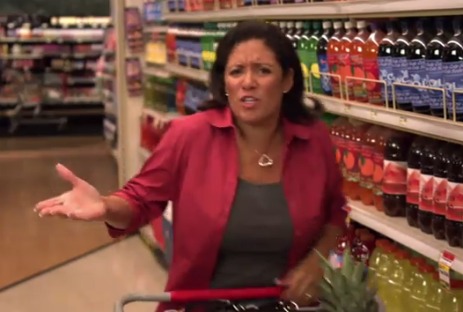Maybe it’s just Monday-morning grumpiness, but I hate the media fixation with Super Bowl ads. Corporations and industry lobby groups drop millions on 30-second spots, and then bloggers scramble to come up with something fresh to say about them — and in the process, amplify their message.
Who benefits? The bloggers generate some on-the-cheap page views for their websites, and the corporate sponsors get extra bang for their advertising buck as their messages “go viral” on YouTube. I’m not sure anyone else, including the reading public, wins.
Having said all of that … did y’all see that ad featuring the supermarket-shopping lady railing against the idea of a national soda tax, as she drops a giant bottle of soda into her groaning shopping cart? The ad is so weird and stark that … I’ve decided to devote a blog post to it.
Something called Americans Against Food Taxes sponsored the ad. Its membership is mostly the predictable corporate crew whose bottom lines might take a hit from less soda consumption: grain-trading giants like Archer Daniels Midland and Cargill; fast-food behemoths like McDonald’s and Wendy’s; sweet-drink purveyors Coca-Cola and Pepsi; and a whole bevy of supermarket industry interest groups. (More puzzling is the smattering of Hispanic groups, most of them business-oriented.)
Walmart, probably the nation’s leading merchant of sweetened drinks, is conspicuously absent from the Americans Against Food Taxes member list, perhaps a reflection of its recently announced commitment to promote healthier food. But it is a member in good standing of at least one trade group that did sign on: the Arkansas Grocers and Retail Merchants Association.
The ad’s message — that the government must stop “trying to control what we eat and drink” — is of course richly ironic. In the early 1970s, the federal government began more or less explicitly pursuing a cheap-corn policy — tweaking policy levers to urge farmers to produce as much corn and soy possible. The resulting explosion in corn production — along with the market for high-fructose corn syrup, rigged up in an unholy alliance between the grain-trading giant Archer Daniels Midland and its government cronies — is largely why people can unthinkingly drop huge bottles of soda into shopping carts.
The idea that a federal soda tax — which, um, doesn’t exist — would represent an unprecedented government intervention into food markets is ludicrous. Virtually everything edible available in the supermarket, outside the produce section, amounts to clever combinations of corn and soy. Whether she likes it or not, that fictional lady in the supermarket is choosing among items available to her by the grace of government policy.
So what do I think of soda taxes? Our own Tom Laskawy has promoted them, as has New York Times economics reporter David Leonhardt. My take is this: All consumption taxes are regressive — that is, they fall much harder on the poor and working class than they do the rich. Thus, I would not support a soda tax if its proceeds got sucked into deficit reduction or war-making. But if its proceeds were directed to doing something positive for the communities it falls hardest on, I would support it. Here’s an idea: how about, tax sweet drinks, and invest the proceeds in rebuilding the local and regional food economies that have been dismantled as a more or less direct result of government food policy over the past half century?



